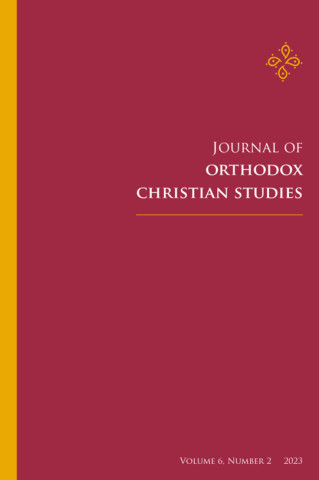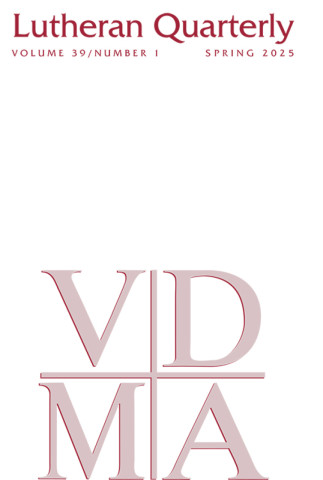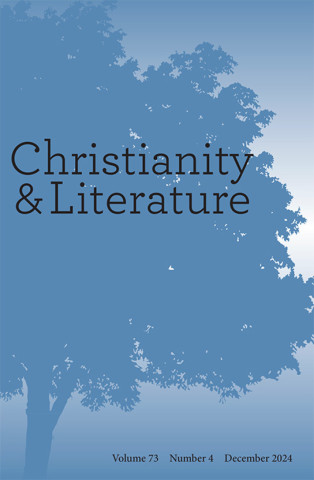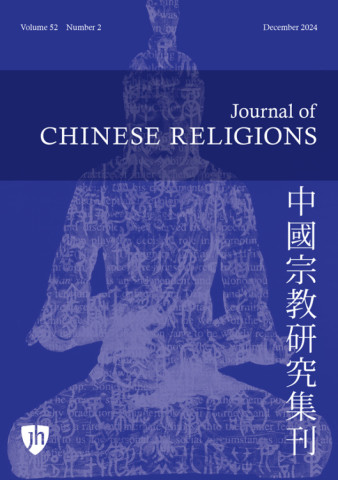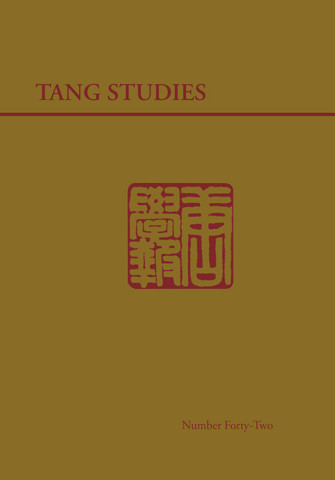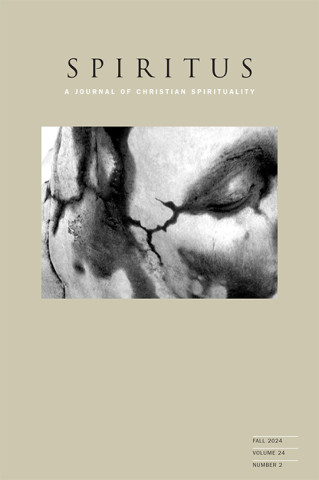

Spiritus: A Journal of Christian Spirituality
The primary aims of the journal are to:
• Promote research and dialogue within the growing interdisciplinary field of spirituality
• Review new studies...
The primary aims of the journal are to:
• Promote research and dialogue within the growing interdisciplinary field of spirituality
• Review new studies and translations of significant works within the field
• Plot the parameters of spirituality as a new academic discipline, keeping to the forefront questions of methodology and interpretation
• Foster interdisciplinary and inter-confessional dialogue, striving to be inclusive of the widest possible range of expressions of Christian spirituality, while also maintaining an open dialogue with other spiritual traditions
• Explore connections between spirituality and cultural analysis (including literary and artistic expressions, social activism, issues of race and gender, and emerging forms of spiritual practice), and
• Encourage research in the history of Christian spirituality (especially in connection with the ongoing publication of critical editions of classic texts).
Journal Details
Online: 1535-3117
Manuscripts should follow the endnote system specified in the latest edition of the Chicago Manual of Style. All text must be double-spaced in a clear, easy-to-read twelve-point typeface on 8 1/2 x 11 inch pages. Text should be left justified with all margins one inch. Submissions should use endnotes. You may cite your own work, but do not use wording that identifies you as the author. Essays are generally not to exceed 7,500 words, including endnotes and other printed matter. Spiritus will acknowledge receipt of your manuscript, but will not return it after review. Prospective contributors are encouraged to correspond with the editors prior to submitting manuscripts.
Decisions are generally made within twelve weeks of receipt. Manuscripts are subjected to blind reviews. If your manuscript is accepted for publication, you will be asked to submit an abstract of less than 100 words, along with 5-6 keywords. You will also be expected to obtain permission to reproduce any copyrighted materials used in your essay.
Submit manuscripts as Word documents, along with a brief biographical statement, electronically to:
Glen G. Scorgie, PhD
Bethel University
email: g-scorgie@bethel.edu
Inquiries concerning book reviews should be made to:
Amanda Avila Kaminski, PhD
Texas Lutheran University
email: akaminski@tlu.edu
Poetry submissions should be made to:
Mark Burrows, PhD
University of Applied Sciences, Bochum (Germany)
email: mark.s.burrows@gmail.com
Include up to five poems in a single attached Word document, also with a short biographical statement. Work already published or under consideration elsewhere will not be considered.
Additional Information for Authors
Spiritus will consider for publication essays written on topics that pertain to the discipline of Christian spirituality. The journal is committed to creative engagement with Christian tradition and to critical reflection on the relationship of Christian spirituality with non-Christian religious traditions. We encourage interdisciplinary inquiry into the subject of spirituality that engages such fields as literature and the arts, philosophy, science and politics. We encourage authors to submit essays that focus on the contemporary situation and speak to current issues and debates.
All essays submitted to Spiritus are subjected to a blind, peer-review process. Therefore please omit any information that would identify you as author.
Style Sheet for Essays
1. Format
- Use a 12-point font (Times New Roman is preferred), with 24-point (double line) spacing for all text, including endnotes.
- Indent each new paragraph; do not leave extra space between paragraphs.
- Number the pages, but do not include any other information in headers or footers.
- Do not include a bibliography or a list of works consulted. Full bibliographical information for any work consulted will appear only in the first endnote that refers to that work.
2. Spelling and Editing
- Unless this style sheet has different instructions, follow The Chicago Manual of Style on general editing questions.
- Use U.S. spelling and punctuation, except in quoted material using U.K. style.
- Use the final “series comma” in lists of three or more items.
- Use italics for emphasis, book and journal titles, and foreign words. Do not use underlining or bolding at all.
- Do not use page, section, or endnote numbers that refer, within your article, to the article itself.
- When there is any question as to capitalization, do not capitalize words.
- Omit hyphens wherever possible.
- Omit bullet points.
- Greek and Hebrew words, which should be used sparingly, must be transliterated and italicized.
- Use only one space to separate sentences.
3. Biblical Citations
References to the Bible may be included within the text of the essay, in parentheses, before the final punctuation of the sentence. Use the shorter abbreviations of biblical books in the Chicago Manual. Separate chapter from verse with a colon. The version you are quoting should be mentioned in the first citation only, preferably by its accepted acronym, as in the following example:
(2 Cor 5:17, NRSV)
4. Abbreviations
Spiritus does not use any Latin abbreviations. Use English phrases instead of i.e., etc., and e.g.
5. General Matters of Style
- Spiritus is read not only by scholars, but also by an educated general audience. When technical or specialized terminology is necessary, explain it.
- Wherever possible, use gender-inclusive language.
- Write in the active, not the passive voice. Avoid the “editorial we.” First-person singular pronouns are quite acceptable.
- In longer articles, include headings and, if necessary, subheadings. In general, these should not be numbered.
- Spiritus readers are diverse; therefore, do not presume that all share your own personal commitments.
6. Endnotes
6.1 General Rule for Endnotes
The general rule is simple. Your first citation of a published work should give all the relevant information. Every reference thereafter should contain only three items: the original author’s last name, a short title for the book or article, and the relevant page number(s).
Spiritus does not use ibid. or loc. cit. or op. cit.
6.2 First Endnote—Books
In the first endnote for a book, give the author’s name, the title, and (in parentheses) the place of publication, publisher, and date; the page number follows, as in this example.1
1 Cristina Mazzoni, The Women in God’s Kitchen: Cooking, Eating, and Spiritual Writing (New York: Continuum, 2005), 33–37.
6.3 First Endnote—Article
For an article, the order is: author’s name, title of the article, name of the journal, volume number, year (in parentheses), and after a colon and a space, the page number.
2 Belden C. Lane, “Merton’s Hermitage: Bachelard, Domestic Space, and Spiritual Transformation,” Spiritus 4, no. 1 (2004): 128.
6.4 First Endnote—Chapters in an Edited Book
The form for a chapter in an edited book is like this.3
3 Constance FitzGerald, “Impasse and the Dark Night,” in Women’s Spirituality: Resources for Christian Development, 2nd ed., ed. Joann Wolksi Conn (New York: Paulist Press, 1996), 428–30.
6.5 First Endnote—Source Accessed Online
The format is the same as the examples above, but with some additional information indicating the source’s online location. This is most commonly indicated by either a DOI4 or a website address (URL).5 If the source is undated, also indicate the date it was accessed. Links should be in the same color as the rest of the text and not underlined.
4 Philip Sheldrake, “God’s Meaning Is Love: The Mystical Theology of Julian of Norwich,” Acta Theologica 32 (2022): 89–103, https://doi.org/10.18820/23099089/actat.sup33.8.
5 Kerry Weber, “Sewing and Praying: Piecing Together the Fabrics of Prayer,” accessed January 18, 2023, https:/www.loyolapress.com/catholic-resources/prayer/arts-and-faith/visual-arts/sewing-and-praying/.
6.6 Subsequent Endnotes
Once complete information has been given, use a short title (which you should determine) in each subsequent endnote, whether of a book6 or an article or chapter.7
6 Mazzoni, The Women in God’s Kitchen, 131.
7 FitzGerald, “Impasse and Dark Night,” 415.
6.7 Some Additional Instructions
- References to classical works that have been published in many editions and translations should be numbered according to the original scheme.8 It is for the author to decide whether to include, as well, information about the modern edition consulted. If you do include this, it should follow the usual format for books as outlined above.
8 Thomas Aquinas, Summa Theologiae III q. 2 a. 1 reply; see also Augustine, De Trinitate VIII 4 (6).
- The ban on Latin abbreviations includes cf. Write “see” or “see also” or “compare” or “consult,” depending on what you mean.
- Longer, explanatory endnotes that include bibliographical information should include it in the format prescribed here.9 For example, the endnote may itself include a quotation.
9 According to Sedgwick, “Of these articles, only Rachel Hosmer provides a view of the field” (Sedgwick, “Accounting,” 177).
The Hopkins Press Journals Ethics and Malpractice Statement can be found at the ethics-and-malpractice page.
Peer Review Policy
Submission Policy
Spiritus: A Journal of Christian Spirituality (SCS) accepts solicited and unsolicited manuscripts. They must be:
- Original work
- Non-simultaneous submission
- Translations accepted with permissions from author or author estate, unless translation in public domain
- Photos and other images are chosen by editorial staff and permissions procured by editorial staff with aid of artist or artist’s estate if needed, unless in public domain
- Reprints generally not permitted
Preliminary Review
- Is conducted by the Editor, Managing Editor, and/or Assistant Editor for weak or unsuitable submissions
Peer Review
- SCS does double blind reviewing for all papers not rejected in preliminary review.
Criteria for Review
What is main aim of the paper?
Does the paper succeed in its aim?
Do you think it is a worthwhile project?
Do you recommend (please pick one):
Review Results and Revisions Required
a) Unconditional acceptance
b) Acceptance subject to small revisions
c) Acceptance subject to substantial revisions
d) Rejection but a positive encouragement to revise and resubmit
e) Rejection but a non-committal invitation to resubmit a substantially revised edition
f) Rejection
If you recommend f) Is this due to
a) The poor quality of the paper?
b) The paper being inappropriate for the journal?
Timetable
4-6 weeks for review process
From submission to publication great variation: 4 to 10 (on occasion, 12) months
Informal Pieces
Occasional “Perspectives” essays; determined as “Perspectives” by Editor, same review (double blind) process.
Interim Editor
Glen G. Scorgie, Bethel University
Book Review Editor
Amanda Avila Kaminski, Texas Lutheran University
Poetry Editor
Mark Burrows, The University of Applied Sciences, Bochum, Germany
Managing Editor
Alison S. Britton, Consulting Services, Inc.
Editorial Board
Michael Battle, PeaceBattle Institute
Lisa E. Dahill, Hartford International University for Religion and Peace
Pieter G.R. de Villiers, University of the Free State
Rebecca G. Giselbrecht, University of Bern
Lisa M. Hess, United Theological Seminary
Bo Karen Lee, Princeton Theological Seminary
Francis X. McAloon, SJ, Fordham University
John Anthony McGuckin, University of Oxford
Pan Yi Jung, China Graduate School of Theology, Hong Kong
Michael O’Sullivan, SJ, Spirituality Institute for Research and Education, Dublin
David B. Perrin, St. Jerome’s University
Philip Sheldrake, Von Hügel Institute, University of Cambridge
Claire E. Wolfteich, Boston University School of Theology
Simeon Zahl, University of Cambridge
Advisory Editors
John Chryssavgis, Greek Orthodox Archdiocese of America
Sarah Coakley, Cambridge University
Joann Wolski Conn, Neumann College
Georgia Frank, Colgate University
Amy Hollywood, Harvard Divinity School
Belden C. Lane, St. Louis University
Bernard McGinn, University of Chicago Divinity School
Barbara Newman, Northwestern University
Hugh Page, University of Notre Dame
William Reiser, SJ, College of Holy Cross
Janet K. Ruffing, RSM, Yale Divinity School
Don E. Saliers, Candler School of Theology, Emory University
Sandra M. Schneiders, Jesuit School of Theology at Santa Clara University
Columba Stewart, OSB, Saint John’s University
Rowan Williams, Magdalene College, Cambridge University
Philip Zaleski, Smith College
Send books for review to:
Amanda Avila Kaminski, PhD
Assistant Professor of Theology
Texas Lutheran University
1000 West Court Street
Seguin, Texas 78155
email: akaminski@tlu.edu
Please send book review copies to the contact above. Review copies received by the Johns Hopkins University Press office will be discarded.
Abstracting & Indexing Databases
- Clarivate Analytics
- Arts & Humanities Citation Index
- Web of Science
- De Gruyter Saur
- Dietrich's Index Philosophicus
- IBZ - Internationale Bibliographie der Geistes- und Sozialwissenschaftlichen Zeitschriftenliteratur
- Internationale Bibliographie der Rezensionen Geistes- und Sozialwissenschaftlicher Literatur
- EBSCOhost
- Academic Search Complete
- ATLA Religion Database (American Theological Library Association), 2001-2016
- Christian Periodical Index, 2006-2012
- MLA International Bibliography (Modern Language Association)
- RILM Abstracts of Music Literature (Repertoire International de Litterature Musicale)
- Elsevier BV
- Scopus, 2009-
- Gale
- MLA International Bibliography (Modern Language Association)
- National Periodical Library
- Guide to Social Work, Social Science and Religion in Periodical Literature (Online)
- OCLC
- ArticleFirst, vol.1, no.1, 2001-vol.10, no.2, 2010
- Electronic Collections Online, vol.1, no.1, 2001-vol.10, no.2, 2010
- ProQuest
- MLA International Bibliography (Modern Language Association)
- ProQuest 5000
- ProQuest Central, 04/01/2017-
- Religion Database, 04/01/2017-
- RILM Abstracts of Music Literature (Repertoire International de Litterature Musicale)
Source: Ulrichsweb Global Serials Directory.
0.1 (2023)
0.3 (Five-Year Impact Factor)
0.00003 (Eigenfactor™ Score)
Rank in Category (by Journal Impact Factor):
Note: While journals indexed in AHCI and ESCI are receiving a JIF for the first time in June 2023, they will not receive ranks, quartiles, or percentiles until the release of 2023 data in June 2024.
© Clarivate Analytics 2024
Published twice a year
Readers include: Scholars and students of Christian spirituality, biblical literature, theology, and religion; clergy, educators, and interested laypersons
Print circulation: 380
Print Advertising Rates
Full Page: (4.75 x 7.5") - $375.00
Half Page: (4.75 x 3.5") - $281.00
2 Page Spread - $563.00
Print Advertising Deadlines
Spring Issue - February 15
Fall Issue - August 15
Online Advertising Rates (per month)
Promotion (400x200 pixels) - $281.00
Online Advertising Deadline
Online advertising reservations are placed on a month-to-month basis.
All online ads are due on the 20th of the month prior to the reservation.
General Advertising Info
For more information on advertising or to place an ad, please visit the Advertising page.
eTOC (Electronic Table of Contents) alerts can be delivered to your inbox when this or any Hopkins Press journal is published via your ProjectMUSE MyMUSE account. Visit the eTOC instructions page for detailed instructions on setting up your MyMUSE account and alerts.
Hopkins Press Journals


